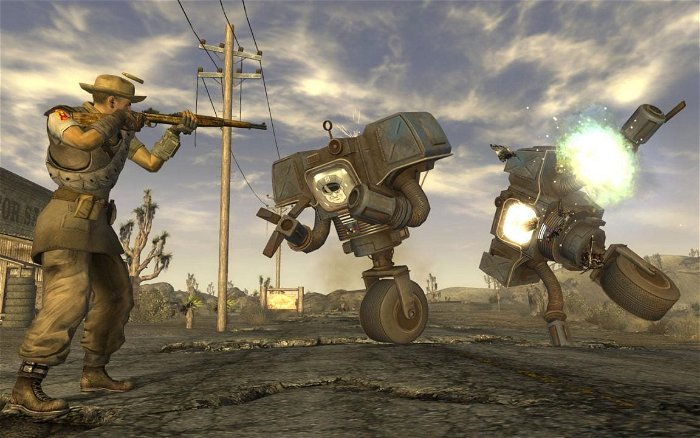This is a topic that I’ve written about in the past, and I was hoping that with the launch of The Elder Scrolls V: Skyrim, it was a topic that was closed and didn’t require any further poking at. Unfortunately I was wrong, and an old wound has re-opened, which makes me wonder just how long PS3 owners should continue to tolerate the problem.
The gist of the matter is that when it comes to the PS3, Bethesda is an abusive partner that continues punish its audience, and that same audience—as well others on the outside—make excuses, apologize for the problem, and ultimately take on the blame, claiming that it’s not Bethesda’s fault. I’m speaking, of course, about Bethesda’s notorious history this generation for producing PS3 versions of their games that are so buggy they hamper enjoyment at best and make the experience nearly unplayable at worst.

This time out—in retrospect with great foolishness—I gave them the benefit of the doubt. There were claims that the game was running on a new engine. That, to my mind, should have solved a lot of problems. However, it later came to light that this new “Creation” engine was actually a heavily modified version of the original Gamebryo engine that had already been the cause of many problems on the PS3. This gave me pause for thought, but I decided that with past errors so well documented, Bethesda would move forward with greater foresight, to avoid the problems that plagued first Fallout 3 and then the effort they handed over to Obsidian, Fallout: New Vegas. This was a new game, with a mostly new engine, it was a new start, right?
Months passed, more of Skyrim was revealed, and we attended various events where the game was shown. It was always shown on the Xbox 360. This made me uneasy. While Bethesda took great pains to have a large presence at the Microsoft X11 event in Toronto, just a couple of months later for the Sony Holiday Preview event, they were conspicuously absent. If you didn’t know any better, Skyrim wasn’t coming to the PS3 at all. Bethesda seemed curiously unwilling to promote the product on the Sony platform, at least in Canada. It was a natural thing to wonder at why this was the case.
With that in mind, we put in our request to Bethesda for a review copy of Skyrim, but we specified we wanted the PS3 version, to see how things had improved from past games. We were told our request had been accepted and we were down for the PS3 version. We checked this repeatedly and were told, yes, we’re getting the PS3 version. When the time came, we received the Xbox 360 version instead with no explanation.

Of course for me, the alarm bells were ringing by now, but I tried telling myself that there might still be a chance this was just some kind of administrative or clerical error. I was still curious to see how the PS3 version held up after all my past extremely negative experiences, so I decided to simply use a copy, bought from a store, to find out for myself.
The first few hours, I had never been more happy to be wrong. Skyrim impressed with its scope, its detail and immersion. As the hours passed, that happy glow dimmed as the game—with alarming regularity—froze while loading me into new areas. I watched my save file get larger and larger and the errors became more frequent and noticeable. Quests not starting, quests unable to be finished despite the fact that object the character wanted was in my hands. Quest items that should have been removed from my inventory, permanently stuck there. Dragons slain but the game wouldn’t let me absorb their soul and consequently spawned the body over and over again at the town of Whiterun, usually at the entrance. And, most depressingly of all, the choppiness. The frame-rate dropping, approaching the likeness of a slide-show only to be rectified, temporarily, by a complete quit out and reload of the game.
In other words, the same error that had plagued the previous two games was still alive and well in Skyrim. After three games and much anguish on the part of PS3 owners, Bethesda knew about the error, but simply didn’t care enough to fix it. What made all this even more depressing was they had so little confidence in their PS3 product that they knew better than to send it to our publication for review. They had hoped we would simply accept the 360 version and not experience the bugginess of the PS3 version for ourselves. That says a lot about a company and its own lack of faith in its product that they would resort to such tactics.

By this point, I have to wonder why they have so many problems with PS3 development that—even with literally years of time to analyze the problem, and creating a new engine—they still can’t achieve parity with the PC and Xbox 360. Are they punishing PS3 owners for owning the “wrong” system? Perhaps they are making indirect comments about either the intelligence or financial condition of people that only own one console and that is not the Xbox 360? For three titles, Bethesda has been impairing the PS3 experience of their games, making it clear that if you want to enjoy a Bethesda game, you have to play it on some other machine. And while they clearly have nothing against taking the money of PS3 owners, they seem to be disappointed with the fact that they have to cater to that audience at all. It is a chore to them, something they almost resent. While their words they have urged all players to enjoy the game on three different platforms, in practice, they are making it obvious that they have little concern, or maybe even active dislike, for people that bought the “wrong,” console, the Sony console. They don’t like the machine, and they clearly don’t care enough about its audience to ensure they enjoy their experience, but they won’t say “no” to the money these people offer them. It feels a bit like the contempt a drug dealer might have for his low income customers, wishing they would go away quickly but needing as much of their cash as possible.
Bethesda understands that multi-platform titles mean more money. But that doesn’t mean they have to like or care about the customers that come to them from the “wrong” side of the tracks and in this case that is PS3 owners. This time out, there’s more outcry from other media outlets, not just our own, which seems to have prompted Bethesda to claim that some action is being taken. But I doubt the effectiveness of their efforts. If this is a problem that they have been unable to solve for five years, how can they now suddenly solve it in less than five weeks? When DLC started releasing for the PS3 version of Fallout 3, this same problem of performance issues tied to large save files was so severe it made the game unplayable. Bethesda did nothing to fix that. It was on the PS3, if consumers were dumb enough to choose that console, it wasn’t their problem.
Now that they’ve shown their contempt for PS3 owners once again, I find their announcement of a patch does little to inspire my confidence. Can problems as numerous as the one’s I’ve encountered be solved by one patch? Can a patch be made that quickly, and if so, why was it never done for the previous games?
I love playing Bethesda games. I just wish they’d be more upfront and either make games only for the Xbox 360 and PC, or else announce ahead of time that players should avoid the PS3 version if at all possible because it’s a buggy mess that is likely to remain that way. I know they’re not going to do either of those things for marketing or financial reasons, but their actions in recent years have more or less said as much far more loudly than their official comments.




